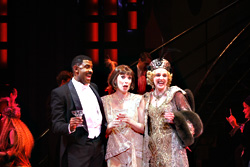There are good reasons why Timothy McCuen Piggee stands out when he’s in a musical. He’s 6-foot-4 and good-looking, occasionally sporting a Clark Gable–style mustache, and he has a talent for playing what he calls “the more well-groomed characters”: sophisticates, wits, noblemen, and priests. He’s got a great baritone, strong comic chops, and a courageous attitude toward trying new things. But as with his current role in Mame at the 5th Avenue, where he plays the title character’s sophisticated New York swain Woolsey, there’s a more obvious reason: In a cast of 30, he’s the only African American.
“It boggles my mind and terrifies me that I’ve now got a career in musical theater,” he says with a laugh, despite a dozen performances at the 5th Avenue and the Village Theatre during the past few years, including the lead in Man of La Mancha at the Village in 2004. “It highlights, for me anyway, my limitations. I’m no shakes at dancing, so every show I find myself hoping I can rise to the challenge.”
Like a lot of theater artists, Piggee ended up in Seattle via a detour on the way back to his life in New York. He caught the attention of a director at Tacoma Actors Guild in 1991, and was offered a season with the company. This led to regular work with the multicultural Group Theatre, as well as roles at the Seattle Children’s Theatre, where his talent for comedy was honed—I particularly remember a turn in drag as a stressed-out mom in The Magic Mrs. Piggle-Wiggle that garnered as much laughter from the adults as from the kids. “SCT were terribly generous and wonderful in their ability to see me as many different things as opposed to just one thing,” he remembers.
These roles in turn led to increased appearances at the larger theaters like Intiman, Seattle Rep, and particularly ACT, where he had a breakout role in 1997 with Pearl Cleage’s Blues for an Alabama Sky, a comedy-drama about the waning days of the Harlem Renaissance. His portrayal of Guy, a gay costume designer with dreams of entrancing Josephine Baker with his sketches, matched the character’s easy charm with a suggestion of a deeply sad and lonely man. He reprised the role at the Milwaukee and Arizona repertory theaters, and this led to an ongoing career on the regional circuit, but since joining the faculty of Cornish a few years ago, he’s focused anew on local work.
As an actor and as a person, Piggee’s got a great sense of humor. David Armstrong, who directed him in Mame as well as a half-dozen other shows at the 5th, says that the actor is masterful at breaking up the monotony of tech rehearsals with well-lobbed witticisms. When he’s playing more serious roles, there’s always a fascinating hint that somewhere under there he’s smiling at the character, daring us to take him as seriously as the character takes himself. At other moments, as with Woolsey, he pulls the opposite trick—when he and Mame are wiped out with the stock market crash, the frivolity’s gone instantly and he’s all business.
While the actor still gets opportunities to do traditional dramas (like playing Tom in The Glass Menagerie at Milwaukee Rep last year), Piggee says that there’s frankly just more work in musicals, where directors are more open to color-blind, or unconventional, casting. That’s no surprise to Armstrong. “In some ways musical theater is like opera, in that we cast according to the skills of the performer, not the appearance,” Armstrong explains, though in the case of Mame, the part was specifically reimagined as African American. “It’s New York in the ’20s and ’30s, and Mame is a free spirit, opposed to narrow-minded bigotry. I thought it enhanced the play without distorting it.” (For the record, it works for me.)
When I ask Piggee why it’s easier for people of color to get roles in musicals, he replies: “There’s just something about black folks singing, I guess!” But then more seriously: “The suspension of disbelief is different in musicals. The same is true for Shakespeare. In both cases the world is more theatrical, and audiences are more open than with kitchen-sink realism.” It’s a challenge to bring life to characters in the corny, anodyne worlds of musicals like Wonderful Town or Gentlemen Prefer Blondes, but he says he enjoys it almost as much as his roles in plays by August Wilson, Lorraine Hansberry, and other African-American playwrights. “Every play has its own music, I believe. Valerie Curtis-Newton [who oversees the Hansberry Project at ACT] once told me, ‘If you’re Irish, you get soda bread. Otherwise, you can enjoy it, but you really don’t get it.’ I’m really grateful to work with so many different kinds of music.”
Regardless of the role, Piggee’s got an unusual take on finding the key to a character. “I try to figure out what would make this person laugh,” he says. “That’s always individual and unique. Once you’ve found someone’s sense of humor, you can relate to them.” And that might just help explain that odd sense of someone smiling behind his performances—not just the actor, but the characters themselves find something to laugh about.
John Longenbaugh








